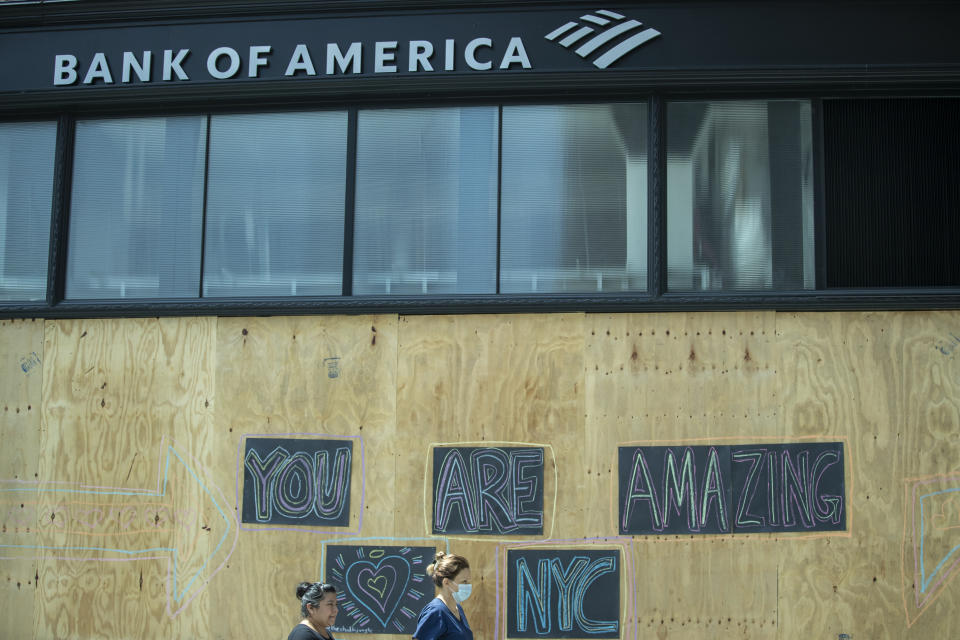Companies with past 'problems' are 'setting the best models’ in response to George Floyd’s death: Yale professor
The police killing of George Floyd in Minneapolis last month elicited statements denouncing racial inequality from major corporations with past scandals and legal settlements tied to alleged discrimination, including Bank of America (BAC), JPMorgan Chase (JPM), and Walmart (WMT).
Some of those companies have been “awakened” by current unrest over racial inequality, says Yale University professor of management Jeffrey Sonnenfeld, who posits that large companies that faced past allegations of discrimination have often responded best in the aftermath of Floyd’s death due perhaps to the criticism they once received for their shortcomings.
Last week, Sonnenfeld convened a virtual discussion of race relations with over 300 chief executives, mayors, and government officials.
“Companies that historically had the biggest problems are often setting the best models right now,” he says. “Maybe it’s from litigation or legislation or people in the media.”
“Some of the irony is that large lumbering older giants have been awakened,” adds Sonnenfeld, who also serves as the senior associate dean of leadership programs at the Yale University School of Management. “Maybe sometimes they’ve been punished in the past. They have found religion, for the most part.”
Bank of America (BAC), which paid $335 million in a settlement to the Justice Department in 2011 for alleged predatory mortgage loans given by a subsidiary lender, “will not tolerate racism in any form,” according to a statement from CEO Brian Moynihan. The company pledged $1 billion last Wednesday to fight racial inequality over the next four years.
Someone “who has come through magnificently well is Brian Moynihan at Bank of America,” Sonnenfeld says. “Putting money where his mouth is.”
Meanwhile JPMorgan Chase (JPM), which in 2018 paid $24 million to settle a lawsuit with six current and former employees alleging racial discrimination and a year before settled a discriminatory mortgage lending case for $55 million, is “committed to fighting against racism and discrimination wherever and however it exists,” says CEO Jamie Dimon and Brian Lamb, Global Head of Diversity and Inclusion.

In the aftermath of Floyd’s death, the company has expanded its work to support black communities around the U.S. and the world, which includes professional development, policy advocacy, and an organization that lends to small businesses called the Entrepreneurs of Color Fund.
Sonnenfeld praised Dimon, who from 2017 to 2019 served as chairman of the Business Roundtable, an association of CEOs at major U.S. companies.
“Dimon got them on track,” Sonnenfeld says. “The U.S. business community is now talking about this in ways that are not the banal statements of the opening of a shareholder report.”
Favorable statements and actions in response to the protests may also prove effective public relations. A large majority 74% of Americans support the protests that have arisen in the wake of Floyd’s death, according to a poll released by the Washington Post on Tuesday, which the newspaper conducted in partnership with the Schar School from June 2 to 7.
Sonnenfeld contrasted the response of legacy corporations with younger companies in the tech sector, which has drawn significant criticism in recent years for a failure to address the lack of gender and racial diversity among its workforce.
“Problem now we see is tech companies and other firms with a myth of meritocracy that haven’t put in these measures,” Sonnenfeld says.
“Not in traditional enterprises but it is many smaller startups where people have no excuse for not having a more diverse workforce,” he says. “There’s not an inherited legacy of promotion pipeline problems.”
Read more:
‘We may need to quarantine our books' when libraries reopen, New York Public Library CEO says
Many retail goods 'likely to go away permanently' post-coronavirus, says investor Glenn Hutchins
Tech giants like Facebook and Amazon should be ‘very mindful of the public trust’: Meg Whitman
Read the latest financial and business news from Yahoo Finance
